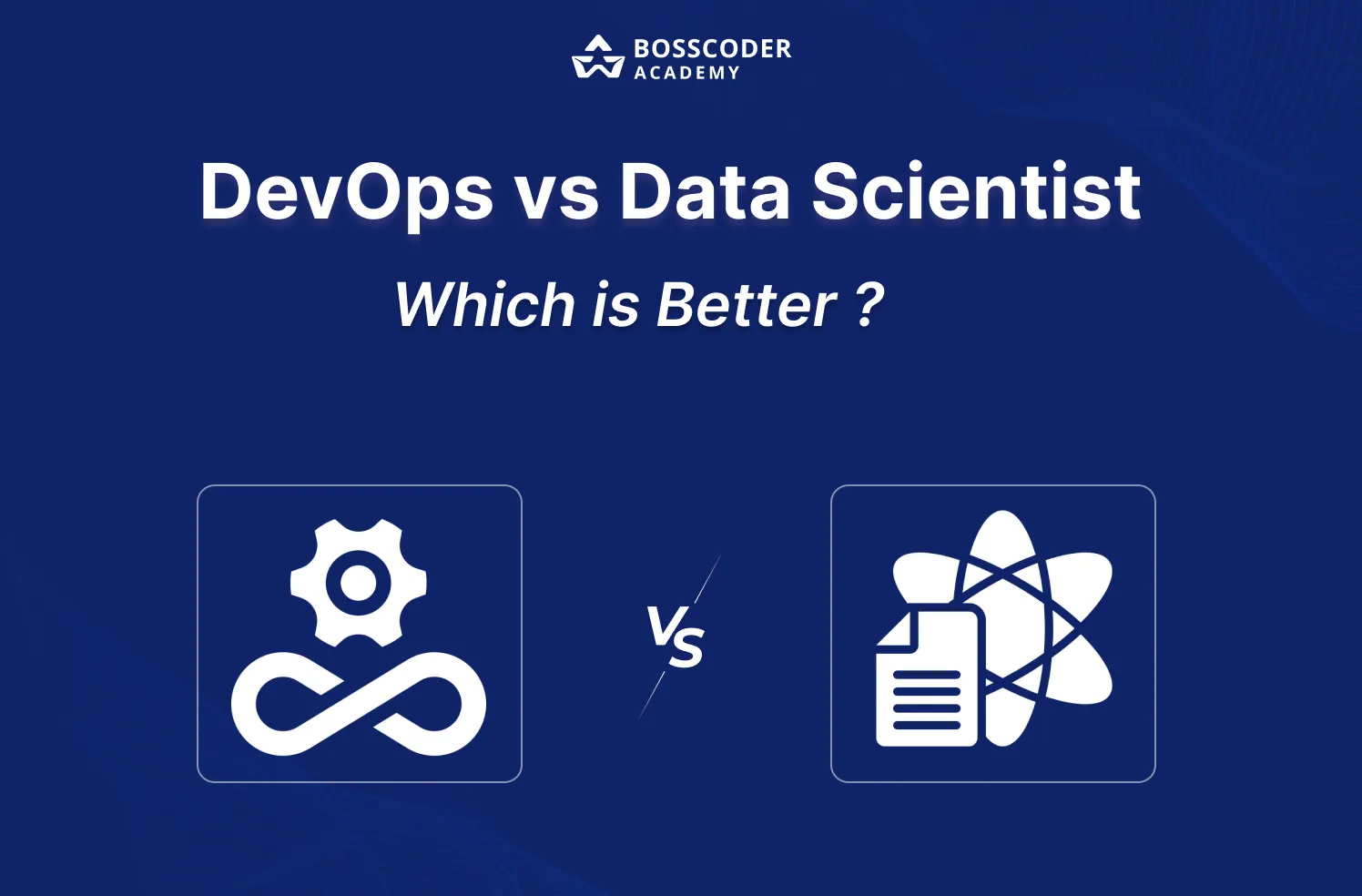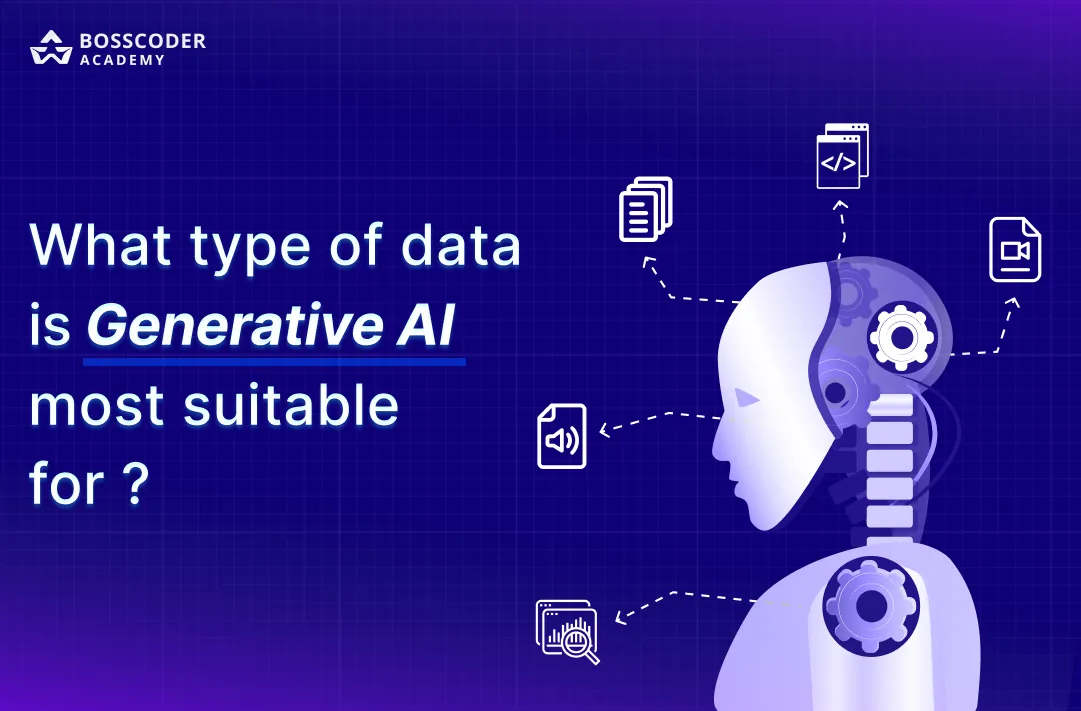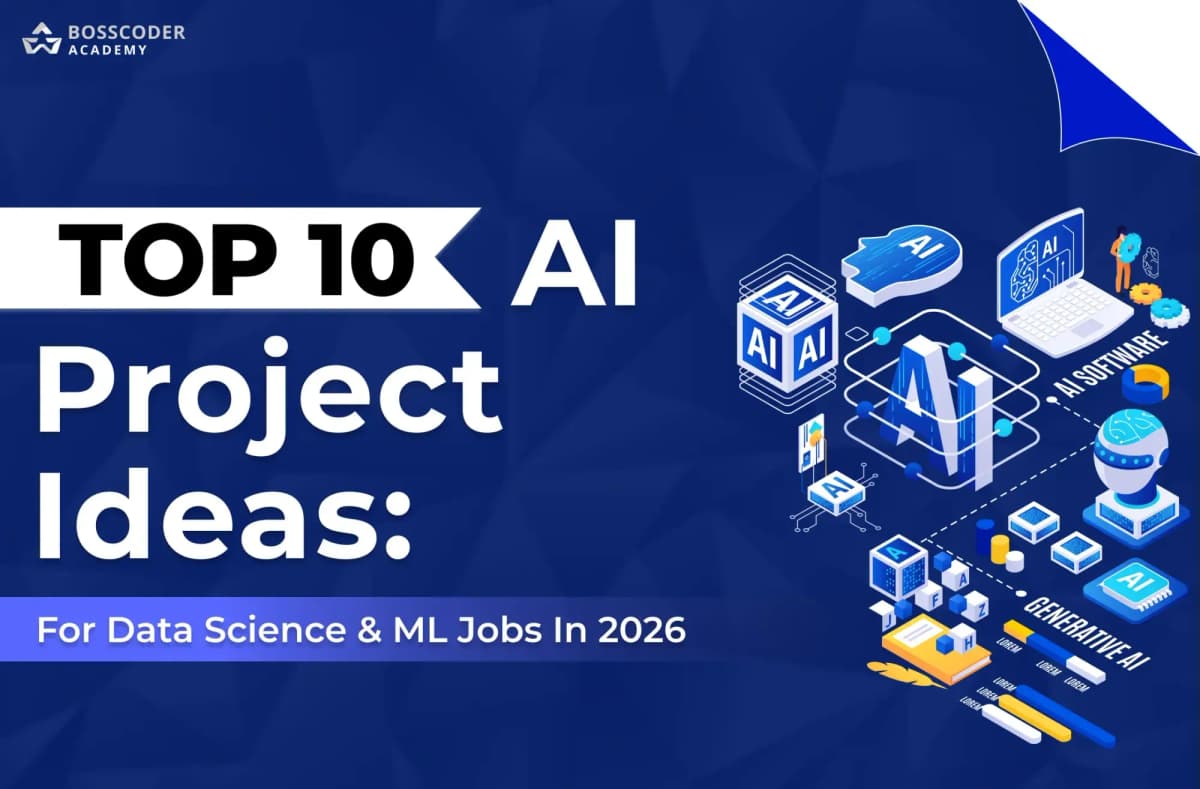 Data Science
Data ScienceDevOps vs Data Scientist: Which is better?

Bosscoder Academy
Date: 15th January, 2025

Contents
Contents
Understanding the Key Differences
Wondering what career in tech would be exciting? The roles of DevOps Engineer and Data Scientist are among the most demanding roles in the industry at this time. These roles are defining the future of technology in very different ways — one optimizes operations, while the other discovers insights from data.

This blog will break down what these roles do, the skills required for success, and how they help a company to grow. We’ll also focus on the career opportunities they provide so you can decide the best one to work with to fulfill your goals.
Are you ready to find your future in tech? Let’s get started!
Who is a DevOps Engineer?
DevOps is a combination of development and operations, aiming to shorten the development lifecycle while delivering high-quality software continuously. The DevOps role is integral to creating seamless workflows between developers and IT operations teams. In essence, DevOps professionals focus on automating the processes of software development and IT operations.
DevOps merges development and operations to reduce the software development life cycle, and this involves delivering high quality software continuously. Creating seamless workflows between IT operations teams and developers involves the DevOps role. In practical terms, it is about automation of operations for software development and IT ops.
Key Responsibilities of a DevOps Engineer:
- Automation and CI/CD Pipelines: Automate software builds, tests, and deployments using tools like Jenkins and Ansible.
- Infrastructure Management: Ensure scalable, reliable systems using cloud platforms like AWS or Azure.
- Monitoring and Optimization: Continuously monitor systems to identify and resolve performance issues.
Skills Required for DevOps:
- Linux/Unix: The use of Linux-based environments is quite common in DevOps engineers.
- Automation Tools: Experience in tools such as Jenkins, Puppet or Ansible is very desirable.
- Scripting: Scripting languages like Python or bash should be known for automation.
- Cloud Platforms: Experience with cloud technologies including AWS, Azure, or Google Cloud.
- Application Packaging: Docker and Kubernetes are well-known technologies, which become critical for modern DevOps processes.
Who is a Data Scientist?
Data scientists deal with analyzing and understanding large datasets for the purpose of making the right choices within an organization. They apply complex pattern recognition and analysis necessary for the identification of patterns within massive data sets and applying those patterns to business solutions. While DevOps aims at software delivery, a Data Scientist’s role is primarily driven by analyzing the data.
Key Responsibilities of a Data Scientist:
- Data Collection and Cleaning:
Data scientists extract data from several sources and then pre-process the data for analysis. This is important as data can be sometimes either missing or inconsistent. - Modeling and Analysis:
Data scientists then apply statistical tools and machine learning algorithms to construct models to predict trends, and patterns and, solve certain business problems. - Data Visualization:
They forwarded their results in a graphical manner such as graphs, charts, and dashboards to ensure that every stakeholder understand the data presented. - Business Insights:
Business executives collaborate with data scientists to design and solve problems and present such solutions that can enhance efficiency or revenue.

Skills Required for Data Scientists:
- Programming Languages: Python, R, and SQL are the programming languages most often utilized for the analysis and manipulation of data.
- Statistical Analysis: To analyze data properly, one needs basic knowledge of statistics.
- Machine Learning Algorithms: Understanding of the various methods of using an algorithm such as regression, classification, clustering, and deep networks.
- Data Visualization Tools: Familiarity with tools like Tableau or other tools like Power BI or QlikView for presenting data.
- Big Data Technologies: It is also common to work with Hadoop, Spark, and other Big Data-related platforms knowledge.
Read our recent blog on- How to become a Data Scientist in 2025?
DevOps vs Data Scientist: Key Differences
Now that we have an understanding of both roles, let's compare them on a few key parameters to better understand how they differ:

Which Role Should You Choose?
The choice between a DevOps career and Data Science is best answered by one’s interest, abilities, and desired career paths. Here's a quick guide to help you decide:
- Choose DevOps if:
- You like to automate workflow processes and ensure that system support is provided properly.
- You are interested in cloud, as well as CI/CD pipelines, and containers.
- You like collaborating with development and operations to make the delivery of software more efficient.
- Choose Data Science if:
- You have a good foundation in Mathematics, Statistics, and computer programming.
- You like to create and analyze a set of recommendations derived from large volumes of data about business decisions.
- You are interested in artificial intelligence recognized and predictive modeling.
Both fields are rewarding, and the choice ultimately depends on what excites you more: enhancing the software delivery processes or gaining insights based on organizing large volumes of data.
Final Thoughts
The decision to choose between DevOps or Data Science is not about the trends, it was more about your interests, your goals and the skills you have. DevOps presents the thrill of improving processes and guaranteeing effective software releases, while Data Science explores how to gain meaningful data values from large datasets.
As proposed, both tracks offer fulfilling occupations or professions and very much in demand in the tech sector as to the recognition given by employers. The trick is to determine what fuels your interest–is it technology and construction or figures and forecasting. Regardless of which route you follow, you must have continual learning and working experience for the best results.
It is time to take control of your tech career right now! Become part of Bosscoder AcademyPython to acquire market-ready skills and open vast possibilities to work in DevOps and Data Science domains.
FAQs
1. What are the key differences between DevOps and Data Science careers?
DevOps is about integrating software development and IT operation to support agile software delivery, whereas Data Science is about discovering insights, patterns from the data for building models for the future. DevOps is for people who like subjects such as cloud computing, automation, and CI/CD, while Data Science is for people who like subjects like machine learning, statistics, and data analysis.
2. Which career path offers better salary, DevOps or Data Science?
Though both are high paying fields, Data Science on average pays a slightly more as compared to Big Data for experts in machine learning & AI. Cloud and automation specialists employed as DevOps engineers are also paid well.
3. What skills are required for DevOps vs. Data Science?
For the DevOps professionals, automation tools such as Docker and Kubernetes, and scripting such as Python and Shell scripts are essential, apart from managing infrastructure. Data Scientists are expected to have programming skills at least in Python or R, statistics skill and machine learning libraries such as TensorFlow, and Scikit-learn.
4. Which career has better growth, DevOps or Data Science?
Both occupations have promising trends in the future. DevOps is important as businesses incorporate cloud structures and using more of the agile software development approach. Data Science is still a rapidly developing field due to AI and Big Data to operate in various areas of healthcare, finance, and marketing.
Related Blogs

What type of data is generative AI most suitable for?
Date: 4th February, 2026

Top 10 AI project Ideas: For Data Science & ML Jobs in 2026
Date: 10th January, 2026

What is Python? Its Advantages and Applications
Date: 18th March, 2025

Data Science Vs Cloud Computing: Which one is better?
Date: 13th March, 2025

High-Demand Jobs: Top Careers with the Highest Salaries
Date: 11th March, 2025

ChatGPT vs DeepSeek: The Final Showdown
Date: 10th March, 2025
